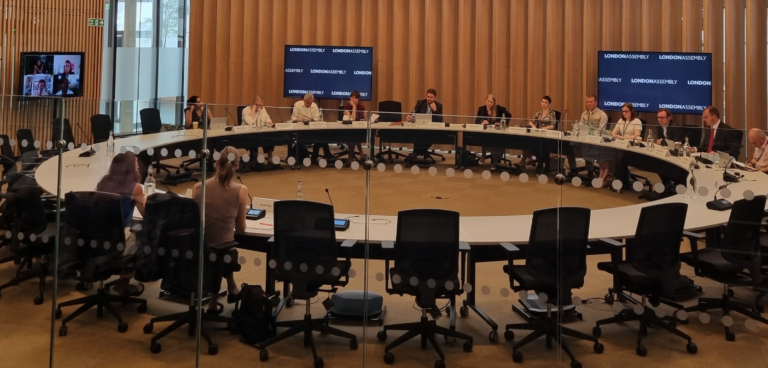Today the London Assembly Transport Committee discussed Transport for London’s (TfL) proposed expansion of the Ultra Low Emission Zone (ULEZ) to encompass the Greater London area in 2023.
The two-panel discussion largely focused on balancing the needs of vulnerable households, the cost of living crisis and the health benefits of clean air for the wider London community.
Representatives from the cross-party committee, which was chaired by former Green Party leader Siân Berry, posed questions to a range of speakers.
The first panel included Laura Vicinanza, policy and stakeholder engagement manager at Inclusion London, Jemima Hartshorn, founder of Mums for Lungs, Steve Gooding, director at RAC Foundation, and Sarah King from the Federation of Small Business.
The second panel was composed of representatives from TfL, namely Alex Williams, director of city planning, and Christina Calderato, director of transport strategy and policy. Elliot Treharne, head of air quality at Greater London Authority, also sat on the panel.
Several of the speakers raised concerns about how the proposed expansion would affect vulnerable households, such as disabled people, those on low incomes and ethnic minority communities.
They were particularly concerned about how the proposal might worsen health inequalities and accessibility issues by pricing people out of journeys across London, which speakers felt was especially pertinent in the current cost-of-living crisis.
Another key focus was the previous use of a scrappage scheme, with speakers commenting on lack of awareness about the scheme and the insufficiency of its funding.
Speaking from a small business perspective, King claimed that many organisations could not afford to upgrade their vehicles even if they were enthusiastic about going green.
She continued by saying that the ULEZ didn’t just affect commercial vehicles, but also customers who may have previously driven into inner London who either no longer wanted to pay the charge or could no longer afford to.
In response to these queries, TfL’s Calderato said: “It’s going to need to be a holistic, multi-faceted approach. There isn’t going to be a single silver bullet.
“When we look at the scale of change that is needed to meet those targets, it’s going to take an intervention like this to get that scale of impact.
“We are looking for something that is going to have maximum benefit for Londoners whilst impacting the fewest people in terms of cost”.
Road user charging was also considered, with TfL expressing plans to further implement the policy across the UK. The issue was likewise featured on their clean air survey.
Committee members posed questions about the future of road user charging and TfL’s development plans, with representatives reiterating to the committee that there needed to be a “holistic, long-term approach” to the issue.
Calderato added that TfL wasn’t “moving the goal post” but is instead starting “with a blank sheet of paper”. She stated that TfL “wants to hear from stakeholders and the public” to address the next generation of charging and that it “knows [it] needs to go further to tackle these challenges”.





